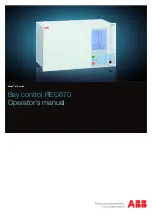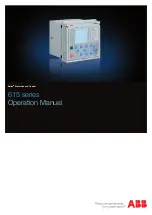
47
VersiStart i III
4F – Motor Temperature Check
Options:
Do Not Check (default)
Check
Description: Selects whether the VersiStart i III will verify the motor has sufficient thermal capacity for a successful start. The soft
starter compares the motor's calculated temperature with the temperature rise from the last motor start and only
operates if the motor is cool enough to start successfully.
4G – Frequency Check
Options:
Do Not Check
Start Only
Start/Run (default)
Run Only
Description: Determines when and if the starter will monitor for a frequency trip.
4H – Frequency Variation
Options:
± 2 Hz
± 5 Hz (default)
± 10 Hz
± 15 Hz
Description: Selects the soft starter's tolerance for frequency variation.
9.4.5
5 Protection Delays
5A – Restart Delay
Range:
00:01 - 60:00 (minutes:seconds)
Default:
10 seconds
Description: The VersiStart i III can be configured to force a delay between the end of a stop and the beginning of the next start.
During the restart delay period, the display shows the time remaining before another start can be attempted.
5B – Current Imbalance Delay
Range:
0:00 - 4:00 (minutes:seconds)
Default:
3 seconds
Description: Slows the VersiStart i III's response to current imbalance, avoiding trips due to momentary fluctuations.
5C – Undercurrent Delay
Range:
0:00 - 4:00 (minutes:seconds)
Default:
5 seconds
Description: Slows the VersiStart i III's response to undercurrent, avoiding trips due to momentary fluctuations.
5D – Instantaneous Overcurrent Delay
Range:
0:00 - 1:00 (minutes:seconds)
Default:
0 second
Description: Slows the VersiStart i III's response to overcurrent, avoiding trips due to momentary overcurrent events.
5E – Input A Trip Delay
Range:
0:00 - 4:00 (minutes:seconds)
Default:
0 second
Description: Sets a delay between the input activating and the soft starter tripping.
5F – Input A Initial Delay
Range:
00:00 - 30:00 (minutes:seconds)
Default:
0 second
Description: Sets a delay before an input trip can occur. The initial delay is counted from the time a start signal is received. The
state of the input is ignored until the initial delay has elapsed.
















































